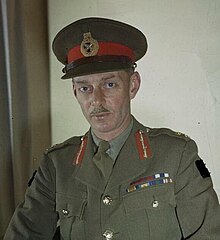General Sir Miles Christopher Dempsey, GBE, KCB, DSO, MC, DL (15 December 1896 – 5 June 1969) was a senior British Army officer who served in both world wars. During the Second World War he commanded the Second Army in northwest Europe. A highly professional career soldier who made his reputation in active service, Dempsey was highly thought of by both his subordinates and superiors, most notably Bernard Montgomery, but is not well known.
A 1915 graduate of the Royal Military College, Sandhurst, Dempsey was commissioned as a second lieutenant in the Royal Berkshire Regiment. As a junior officer, he fought on the Western Front during the First World War, where he was wounded, and was awarded the Military Cross. After the war, he served in Iraq during the Iraqi revolt of 1920, in Iran during the Russian Civil War, and in India.
During the Second World War Dempsey formed a close relationship with Montgomery. He commanded the 13th Brigade in the Battle of France in 1940, and then spent the next two years training troops in England. He commanded the Eighth Army's XIII Corps in the Allied invasions of Sicily and Italy in 1943. He commanded the Second Army during the Battle of Normandy and made rapid advances in the subsequent campaign in Northern France and Belgium.
After the war, he commanded the Fourteenth Army in the Far East, and the Middle East Command during the Greek Civil War and the Palestine Emergency. He retired from the Army in 1947, and was involved in horse racing. He bred and raced his own horses, and was Chairman of the Racecourse Betting Control Board from 1947 to 1951.
